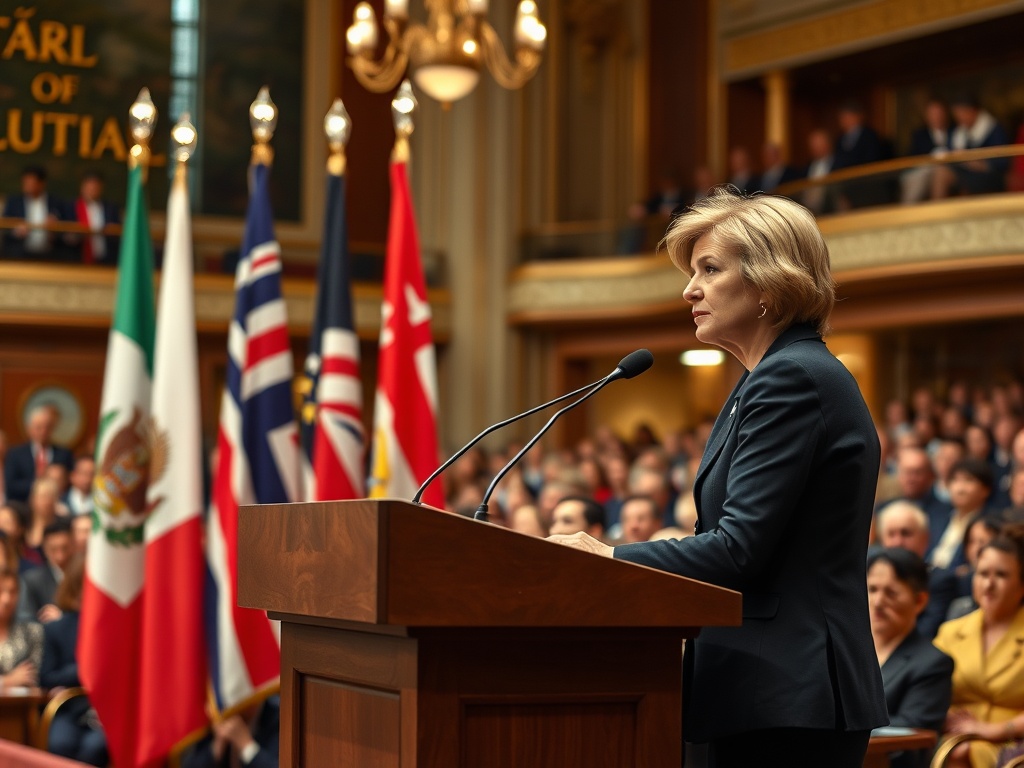Badenoch’s Foreign Policy Speech: A Call for Change Amid Rapid Political Shifts

In her inaugural major foreign policy speech as leader of the Conservative Party, Kemi Badenoch demonstrated a clear inclination towards her comfort zone. However, the political landscape is evolving at an unprecedented pace, and her approach may not be keeping up.
Badenoch has initiated a series of policy reviews within the Tory party, aiming to have comprehensive strategies prepared well ahead of the next general election slated for 2029. She appears confident that her analytical mindset will allow her to methodically address pressing issues. Yet, the urgency of the current political climate is proving to be a formidable challenge.
During her keynote address on foreign affairs, Badenoch emphasized the necessity for increased defense spending, yet she stopped short of establishing a new target. Instead, she articulated a need for spending to exceed 2.5 percent of GDP by 2030, while advocating for significant cuts to both foreign aid and welfare budgets to finance this increase. Additionally, she grapples with the legacy of the previous Conservative government, which saw troop numbers dip below 73,000 for the first time since the Napoleonic Wars.
To underscore her challenges, just two hours after her speech, Prime Minister Sir Keir Starmer delivered an unanticipated statement in the House of Commons, making a similar argument. He unveiled plans for what he termed the “biggest sustained investment in defense since the Cold War,” proposing to raise spending to three percent post-2030 by reallocating funds from the aid budget. Badenoch finds herself outpaced by her political rivals.
At the same time, a recent YouGov poll revealed that Nigel Farage’s Reform UK party is gaining traction, further complicating Badenoch’s position. Reform UK, with its robust online presence and energetic Friday night rallies, is shaping the current political discourse.
Starmer expressed reservations about cutting the foreign aid budget but linked it to defense funding, effectively placing his uninitiated military plans in direct competition with those of both Reform UK and Badenoch’s Conservatives. His strategy is likely to resonate well with voters, despite potential backlash from some within the Labour Party.
In Reform UK’s 2024 “contract” with voters, Farage pledged to boost defense spending to 2.5 percent by 2027, with a subsequent increase to three percent by 2030. Starmer’s proposal aims to elevate UK defense spending to three percent by the “end of the next Parliament,” projected for 2035.
During his address to MPs, Starmer also touched upon a broader political philosophy. He stated, “We must reject any false choice between our allies, between one side of the Atlantic or the other. This goes against our historical ties, both as a nation and a party, as it contradicts our fundamental national interests. We have endured countless external challenges in the past, fought wars together, and maintained close partnerships in trade, growth, and security. Therefore, when I meet President Trump this week, I will make it clear that I want this relationship to flourish.”
Starmer’s position undoubtedly strengthens his stance ahead of his meeting with Trump in Washington on Thursday, especially following the President’s call for NATO allies to allocate five percent of their GDP towards defense. NATO Chief Mark Rutte has indicated that spending should exceed three percent.
The transatlantic alliance regarding the conflict in Ukraine faces significant strain due to Trump’s approach, which includes dialogues with Russian President Vladimir Putin, labeling Ukrainian President Volodymyr Zelensky a “dictator,” attributing blame for the war to Kyiv’s forces, and voting alongside Russia, North Korea, and Iran against a UN resolution condemning Russian aggression.
In London, and with the assurance that it was a hypothetical discussion, Badenoch declared that she “wouldn’t shy away” from calling Putin a dictator directly to Trump if she were visiting Washington this week. However, this assertiveness might carry more weight if she had opened the floor to inquiries from less favorable media outlets following her speech.
At the Policy Exchange think tank, Badenoch also suggested that the UK should contemplate withdrawing from the European Convention on Human Rights, although she did not elaborate further on this stance compared to her comments during the Tory leadership campaign. This left some hardline Eurosceptics in attendance feeling underwhelmed. Additionally, she refrained from announcing specific targets for reducing Britain’s contributions to the World Health Organization.
For those seeking philosophical insights, Badenoch’s address delivered in spades. She argued that in light of rising threats both domestically and internationally, too much emphasis has been placed on values at the cost of national interests. She proposed the concept of “conservative realism,” which advocates for a pragmatic, occasionally protectionist approach to foreign relations. Niall Ferguson, a historian and former advisor on Republican presidential campaigns, was present and echoed her sentiment, highlighting the concerning trend of countries spending “more on debt interest than on defense.”
Concluding her speech, Badenoch reiterated, “I have consistently maintained that we must champion Western values of liberalism; those Enlightenment principles are worthy of our defense.” The Shadow Cabinet, present in full force, applauded her remarks politely. Publicly, they seem content with her cautious strategy, though frustration is brewing among a segment of the broader Parliamentary Tory party, with some MPs voicing their dissatisfaction over the prolonged delay in improving opinion poll standings.
Badenoch cautioned that the UK faces a “bitter reckoning” unless it recognizes that “it is no longer 1995.” Time is indeed of the essence. With the unpredictable nature of Trump in the White House, the political climate feels far more volatile than it did even a year ago.




